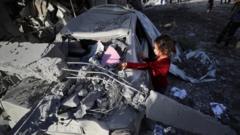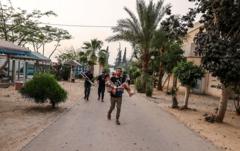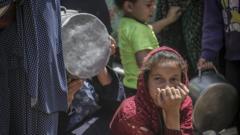The recent attempted assassination of Hamas leader Muhammad Sinwar could disrupt group operations but may not lead to significant changes in their overall strategy or negotiation stance with Israel.**
Strategic Implications of Militants' Deaths on Hamas Leadership Dynamics**

Strategic Implications of Militants' Deaths on Hamas Leadership Dynamics**
Analysis of the potential impact of targeted strikes against Hamas leaders on long-term group strategy.**
In a recent development in the ongoing Israel-Hamas conflict, the attempted assassination of Muhammad Sinwar, a prominent Hamas leader, has raised questions about the long-term implications for the group. While the strike against Sinwar could serve as a tactical win for Israel, experts warn that it may not shift the strategic dynamics within Hamas or its approaches to cease-fire negotiations.
Sinwar is viewed as a critical military figure within Hamas, known for being outspoken against concessions to Israel, particularly concerning the group’s weapons stockpile, a key condition for any sustainable ceasefire. His position becomes even more significant given his familial ties; he is the younger brother of Yahya Sinwar, who led a fatal offensive against Israel in October 2023 and was subsequently killed by Israeli forces.
Analysts suggest that while Sinwar’s death would mark another setback for Hamas—following numerous high-profile losses—it might not necessarily facilitate a change in policy or a shift towards negotiation from the group. "Hamas is a complex entity, and while leadership changes can affect operations, they don't halt the group’s mechanisms or the collective decision-making processes that define its strategy," commented Mkhaimar Abusada, a political scientist based in Gaza.
Furthermore, there is uncertainty surrounding the profile of Sinwar’s potential successor. If the new leader adopts an even more hardline approach, rather than moderating the movement’s stance, this could further entrench the cycle of violence rather than pave the way for dialogue and peace. Thus, while Israel aims to weaken Hamas’s capabilities, the results of such tactical strikes might diverge from the intended outcomes, perpetuating an ongoing cycle of conflict in the region.
Sinwar is viewed as a critical military figure within Hamas, known for being outspoken against concessions to Israel, particularly concerning the group’s weapons stockpile, a key condition for any sustainable ceasefire. His position becomes even more significant given his familial ties; he is the younger brother of Yahya Sinwar, who led a fatal offensive against Israel in October 2023 and was subsequently killed by Israeli forces.
Analysts suggest that while Sinwar’s death would mark another setback for Hamas—following numerous high-profile losses—it might not necessarily facilitate a change in policy or a shift towards negotiation from the group. "Hamas is a complex entity, and while leadership changes can affect operations, they don't halt the group’s mechanisms or the collective decision-making processes that define its strategy," commented Mkhaimar Abusada, a political scientist based in Gaza.
Furthermore, there is uncertainty surrounding the profile of Sinwar’s potential successor. If the new leader adopts an even more hardline approach, rather than moderating the movement’s stance, this could further entrench the cycle of violence rather than pave the way for dialogue and peace. Thus, while Israel aims to weaken Hamas’s capabilities, the results of such tactical strikes might diverge from the intended outcomes, perpetuating an ongoing cycle of conflict in the region.






















